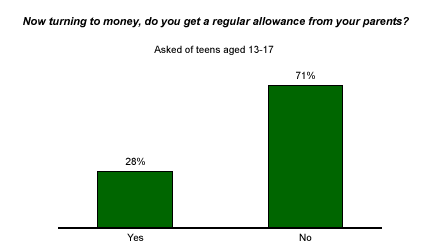Many adults learn about handling money the hard way. The rising number of personal bankruptcies in the United States attests to the difficulties millions of Americans experience with managing their finances. While it may be too late for some adults, teaching children healthy financial habits may help them avoid painful lessons when they grow up.
Parental involvement and early, consistent experiences with money management are key to developing kids' financial habits, according to money management experts. Allowances, several experts suggest, are one way to introduce money management concepts. Opening savings accounts and setting savings and spending goals are also crucial to building skills that last a lifetime.
A recent Gallup Youth Survey* asked teens (aged 13 to 17) a number of questions about their financial habits. The survey sought to find out if teens have savings or checking accounts, whether they receive allowances, and if they work for their allowances. Overall, teens' responses indicate most are getting at least some money management experience, especially when it comes to saving their money. However, it seems that girls may be getting a little more practice at managing their money than boys are. More girls than boys receive allowances, have savings accounts, and have debit cards.

Overall, a majority of teens (58%) said they have savings accounts, but a substantial minority of them (41%) do not. Girls are somewhat more likely than boys to have savings accounts; 65% of girls said they have these accounts, compared with 52% of boys who said so.
Only 28% of teens said they get allowances on a regular basis from their parents. It's possible that some of these teens don't get allowances because they have part-time jobs. However, similar percentages of older teens (aged 16 to 17) and younger teens (aged 13 to 15) reported receiving regular allowances, which indicates that -- job or no job -- relatively few parents may be choosing to give their children regular allowances.

Gallup also asked teens whether they are expected to work around the house to earn their allowances. Eighty-three percent of teens who get an allowance said they are expected to work for it, compared with 16% of teens who said they are not expected to work for it.
Bottom Line
Kati Poppert, 14, of Lincoln, Neb., has had a savings account since she was a baby, and currently receives an allowance from her parents. "I save part of it [my allowance], then give part of it to church, and spend whatever is left," she says. "Sometimes when I don't have enough money for something, I put away a little money each month."
Does Kati think receiving an allowance and having a savings account has helped her learn about saving and spending? Yes, she says, but her parents have helped her learn the most.
*The Gallup Youth Survey is conducted via an Internet methodology provided by Knowledge Networks, using an online research panel that is designed to be representative of the entire U.S. population. The current questionnaire was completed by 517 respondents, aged 13 to 17, between Aug. 1 and Aug. 29, 2003. For results based on the total sample, one can say with 95% confidence that the maximum margin of sampling error is ±5 percentage points.